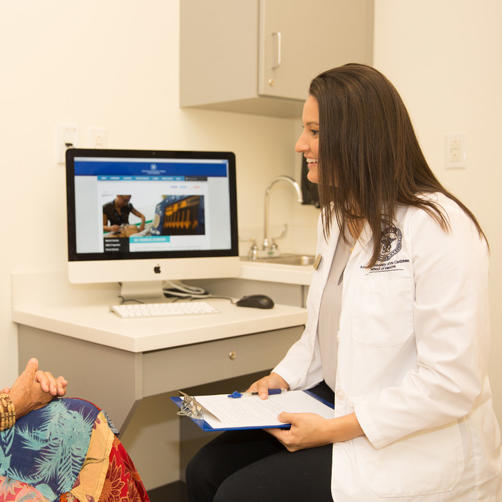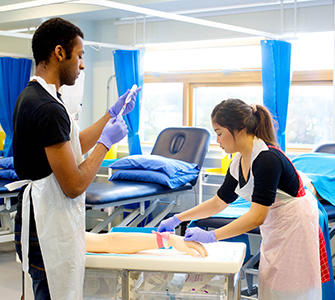It can be tempting to think of children as little more than smaller versions of adults. But from a medical perspective, children are so much more. They have physical, developmental, and behavioral needs all their own. Providing medical care for children is the job of the pediatrician. But what is a pediatrician?
A pediatrician is a medical doctor who sees to the needs of infants, children, adolescents, and young adults. For many young people, a pediatrician is the primary care provider from birth, perhaps through the age of 18. The word pediatrician comes from the Greek word for child.
A pediatrician is often the first person parents call when their child is sick. A pediatrician in general practice must be skilled at treating common childhood ailments, from ear infections to minor injuries. Subspecialist pediatricians may have additional training in treating young people with serious or chronic illness, from developmental disorders to childhood cancers.
Being a pediatrician is about more than just treating illness. More than any other patients, children grow and change. An important part of the job of the pediatrician is to help ensure that children are achieving milestones in their growth, behavior, and skills. Educating the parents in proper care of children is also part of the pediatrician’s role. Pediatricians often advise parents in matters of health, nutrition, safety, and fitness.
Treating young people can be a challenge. A pediatrician’s youngest patients lack the communication skills to tell a doctor what is wrong with them. The pediatrician must rely on intuition and deductive skills to properly assess their health. Older children can be unruly or reluctant patients, requiring vast reserves of patience and empathy.
Caring for children is often a challenge, but the payoff can be extremely rewarding. Pediatricians may enjoy long term associations with their patients, and watching them grow into healthy adults can be among the more gratifying experiences in medicine. For a person who loves children, there are few higher callings than pediatrics.
WHAT IS A PEDIATRICIAN'S DIFFERENCE FROM A FAMILY PHYSICIAN?
Practitioners of family medicine treat people of all ages, from children to adults and even the elderly. The choice of whether to take a child to a pediatrician or a family physician is often a personal one. However, pediatricians have specialized training in ministering to the emotional and behavioral needs of children, in addition to their medical needs. They may also have broader experience in recognizing and treating childhood illness.
WHAT DOES A PEDIATRICIAN DO?
Parents may bring their child to a pediatrician for a regular scheduled examination or as the result of a complaint, such as injury or illness. Either way, the visit centers around a physical examination. The pediatrician may weigh and measure the child; look into the eyes, ears, nose, and throat; listen to the lungs and heartbeat, and ask general questions about the child’s health. A pediatrician may check for such common growth issues, such as joint misalignments. The pediatrician may order such additional tests as X rays or urine samples.
Well-child checks are an important part of the pediatrician’s job. Parents often select a pediatrician before their child’s birth, and the first time a newborn sees a pediatrician will be in the hospital. A pediatrician may see an infant perhaps a dozen times from birth to age 2 and several times a year from age 2 to 5.
From the age of 5 on, a pediatrician generally sees a child for annual examinations until the patient moves on to an adult doctor. Children often see pediatricians to get examinations required for enrollment in school or participation in sports.
The pediatrician must be versed in treating childhood injuries and illnesses. A number of infections are more common among children than adults. Children are also prone to such injuries as sprains and broken bones.
Pediatricians often prescribe such medicines as antibiotics and painkillers. They are also responsible for administering regular immunizations that help prevent disease. The pediatrician may refer the child to a specialist for more serious issues or ones requiring highly specialized care.
Interacting with parents or other caregivers is a major part of a pediatrician’s job. Younger patients are generally unable to comply with a course of treatment on their own, so the pediatrician must enlist the help of parents, guardians, or other family members. The pediatrician must be sure that caregivers are aware of the risks associated with a particular condition or treatment. A pediatrician must also be able to answer questions about a child’s growth and development.
HOW TO BECOME A PEDIATRICIAN
To be a pediatrician, you must first become a physician by graduating from an accredited medical school—such as American University of the Caribbean School of Medicine* (AUC). The path to a medical degree at AUC, which is located on the Caribbean island of St. Maarten, is the same as at United States-based schools: two years of medical science classes and two years of hands-on clinical training. For AUC students, the medical sciences curriculum is completed at the St. Maarten campus; the clinical training can be completed at affiliated teaching hospitals in the United States or in the United Kingdom.
AUC also partners with the University of Central Lancashire (UCLan) in the United Kingdom for a “UK-track” option. The first two years at UCLan focus on studying the medical sciences. Upon completion, students receive a Post Graduate Diploma in International Medical Sciences, which AUC recognizes as equivalent to its own medical sciences curriculum. During the final two years, students can then complete clinical training across AUC’s network of affiliated teaching hospitals.
During clinical training, AUC students complete core rotations in internal medicine, surgery, pediatrics, family medicine, obstetrics/ gynecology, and psychiatry. Each individual student, then, selects from among dozens of specialty elective clerkships to fulfill their remaining clinical requirements.
During the fourth and final year of medical school, students prepare for the next phase of their medical education: residency. At AUC, the Office of Career Advisement (OCA) can help students determine which residency specialty—such as pediatrics—suits them best. The OCA then helps students negotiate the National Resident Matching Program® (NRMP®)—a placement system which medical students who wish to become licensed in the United States use to “match” with a medical residency. Residencies are required to become a licensed physician, and they last from three to eight years. A pediatric medicine residency is at least three years.
In 2021, AUC had a first-time residency attainment rate of 92 percent for 2020-2021 graduates—on par with the overall match rate (92.8 percent) for medical schools in the United States. In recent years, AUC MDs have matched with pediatric medicine residencies at such hospitals as the Children’s Hospital of Michigan; the Marshfield Clinic in Wisconsin; Nassau University Medical Center in New York; and Peyton Manning Children’s Hospital in Indiana.
After pediatric training, qualified candidates may be certified by the American Board of Pediatrics (ABP). Board-certified pediatricians may then join the American Academy of Pediatrics. Doctors who want to pursue a pediatric specialty must take additional years of fellowship training.
The ABP works with other specialty boards to create dual programs, and a doctor may pair pediatric training with a second specialty to become “double-boarded.” ABP-approved combined training programs include:
- Internal medicine/ pediatrics
- Pediatrics/ anesthesiology
- Pediatrics/ dermatology
- Pediatrics/ emergency medicine
- Pediatrics/ medical genetics and genomics
- Pediatrics/ physical medicine and rehabilitation
- Pediatrics-psychiatry/ child and adolescent psychiatry
MEET A PEDIATRICIAN
Natacha Pierre, MD, a 2014 AUC graduate, is a pediatrician at Medical City Children’s Urgent Care in Plano, Texas. We asked Dr. Pierre to describe the role of a pediatrician.
Q: Why did you decide to go into your specialty?
A: I am a huge proponent of preventive health. Taking care of children means influencing the health of future generations from the time they leave the womb to the time they go to college. Children are also very resilient and I rarely have a dull day. From infancy to age 18, pediatric physiology, differentials, medicine doses, and even a kid’s ability to tell you what is wrong change so much from patient to patient that it keeps you on your toes. Whether my patients are anxious, talkative, or timid, I always end my day with a huge smile. I can’t imagine doing anything other than pediatrics!
Q: Any advice to medical students considering the specialty?
A: It’s okay to be scared of children, especially holding a newborn for the first time on your pediatric rotation. Being scared, however, doesn’t mean that the field isn’t for you. Pediatrics has its many challenges like all specialties, and you will quickly learn that kids are not small adults. With practice, patience, a few jokes tucked in your pocket, and a nice smile, pediatric patients will never cease to amaze you. Furthermore, taking care of them (and, essentially, their families, too) is a wonderful privilege.
Q: What’s the most rewarding part of your job?
A: Though a sizable portion of my patients can’t directly tell me what is wrong, listening to their families explain what is wrong and observing and examining the child can reveal quite a bit. And with the right intervention, most children rebound quickly. Seeing the look on the faces of parents who go from anxious to elated when their child improves never gets old. I truly feel as though I am making a difference. Also, nothing is quite as satisfying as the instant gratification of reducing a nursemaid’s elbow!
If you want to become a doctor, and a career as a pediatrician appeals to you, learn more about the AUC MD Program and investigate the Office of Career Advisement. When you’re ready, take the next step on your path to a specialization in pediatric medicine: apply for admission to American University of the Caribbean School of Medicine.
SUBSPECIALITIES IN PEDIATRICS
The American Board of Pediatrics and its partners offer certification in 20 subspecialties of pediatrics. They are:
- Adolescent medicine
- Pediatric cardiology (treating the heart)
- Child abuse pediatrics
- Pediatric critical care medicine
- Developmental-behavioral pediatrics
- Pediatric emergency medicine
- Pediatric endocrinology (treatment of hormone related issues, including diabetes)
- Pediatric gastroenterology (treatment of the stomach and intestines)
- Pediatric hematology-oncology (treatment of blood disorders and cancer)
- Pediatric hospital medicine
- Pediatric infectious diseases
- Neonatal-perinatal medicine (including the treatment of infants and premature babies)
- Pediatric nephrology (treatment of the kidneys)
- Pediatric pulmonology (treatment of the lungs)
- Pediatric rheumatology (treatment of autoimmune illnesses)
- Hospice and palliative medicine
- Medical toxicology
- Sleep medicine
- Sports medicine
- Pediatric Transplant Hepatology (liver transplant)
YOUR CAREER AS A PEDIATRICIAN
It may seem obvious, but pediatrics generally attracts people who like working with children. Dealing with children and parents requires patience and communication skills. Compassion and empathy are important in handling frightened youngsters and overwhelmed caregivers. Pediatricians often spend long hours on their feet, requiring stamina and endurance.
Pediatricians in general practice may spend 40 to 50 hours a week seeing patients. Emergencies can occur at any hour, so a pediatrician may need to be available for on-call duties on nights and weekends. Pediatricians often work together in group practice, enabling them to share these responsibilities. They may also work in hospitals, clinics, and other settings.
A pediatrician’s office is designed with children in mind but often provides a pleasant working environment for adults. More than many other specialists, pediatricians spend time in wellness checks with generally healthy patients. Some pediatric subspecialists spend much of their time working with children who are seriously ill. Such work can be emotionally challenging, but also highly rewarding and mentally stimulating.
The job outlook for pediatricians is good. According to the U.S. Bureau of Labor Statistics, jobs for all physicians are expected to grow by 4 percent from 2019 to 2029. Factors that contribute to job growth in pediatrics include a growing population. Pediatricians are also increasingly in demand to treat childhood metabolic problems, such as those that contribute to obesity, and developmental disorders, including autism spectrum disorders. According to U.S. News and World Report, pediatricians have an unemployment rate of 0.3 percent.
Now that you know the answer to the question, “What is a pediatrician?”, are you ready to pursue an exciting and rewarding career treating children and other young people? Apply for admission to AUC School of Medicine.
Related Resources:






